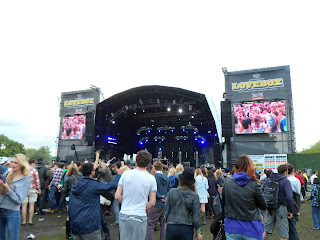Punk In Africa
- film review
By Kevin Robinson(Louder Than War, June 2012)
http://louderthanwar.com/punk-in-africa-2011-film-review/
Punk In Africa (2011)
Director: Keith Jones, Deon Maas
UK premiere: Open City Docs
Fest, School of Oriental
and African Studies, London
Director: Keith Jones, Deon Maas
Saturday 23rd June 2012
"Louder!” shout several
voices from the rear of the lecture theatre as someone battles heroically with
the controls of a DVD player. It seems a reasonable request. This is punk after
all, just a chapter in its history which has, until now, remained untold. Just
as punk in the UK grew out
of social deprivation and disillusionment and led to the proliferation of a DIY
ethos, in Southern Africa the first
multi-racial punk bands formed in the chaotic aftermath of the Soweto Uprising,
their very existence risking possible imprisonment and brutal torture. These
musicians were inspired by their African identity and indigenous musical
traditions, as well as their Ramones and Sex Pistols bootlegs. Punk In Africa
documents a growing subculture during eras of apartheid, civil war and oppression,
when opposition to institutionalised racism and resistance of totalitarian regimes
could have violent repercussions (“They could make you disappear,” as one interviewee
chillingly describes).
The first rumblings of a punk
scene in the so-called Dark Continent emerged
in the form of underground rock acts like Suck, an early '70s politicised protopunk
band, who were banned from performing after their concerts provoked rioting.
They are included on this terrific compilation of vintage South African garage,
psychedelia and township funk.
The film’s archive footage
is assembled in a way which matches the scrapbook visual aesthetic of punk. Appeals
from the film makers via social media, predominantly Facebook, unearthed a bewildering
amount of artefacts in the form of photos, flyers, 7" sleeves, taped
interviews, home movies and fragments of live recordings. In addition, there
are fresh interviews with the prime movers from the late 70’s/early 80’s
period, astonishingly as much of a fertile ground for musical experimentation across
Southern Africa as it was in the West.
Wild Youth from Durban Johannesburg Cape Town based ‘goema punk’
band who played traditional Cape
Malay Cape
Town
This mix tape features many
of the artists featured in the film:
Finally, the film follows punk’s
evolution and the rise of more celebratory, 2-Tone influenced ska bands through
the democratic era of the 1990’s to the present day. These include Cape Town’s
ska-punks Hog Hoggidy Hog, Johannesburg’s Afrocentric Swivel Foot, the dub
influenced Mozambican band 340ml, the surf and skate culture fixated Sibling
Rivalry, Evicted - a Zimbabwean band who mix elements of grunge, hard rock and
traditional chimurenga music, Fokofpolisiekar, Fuzigish… the list is seemingly
endless.
This is an enlightening film
which goes some way to giving these brave, rebellious men and women long
overdue recognition. Despite incessant surveillance and harassment from the authorities,
they used music to convey their anger, frustration and determination for
political change. This music, broadcast only via a network of fanzines and
tape-trading, helped pave the way for a youth revolution, leading to rules and
regulations gradually being relaxed, and eventually the collapse of the
apartheid regime.
Follow: @kevinrobinsondj





















